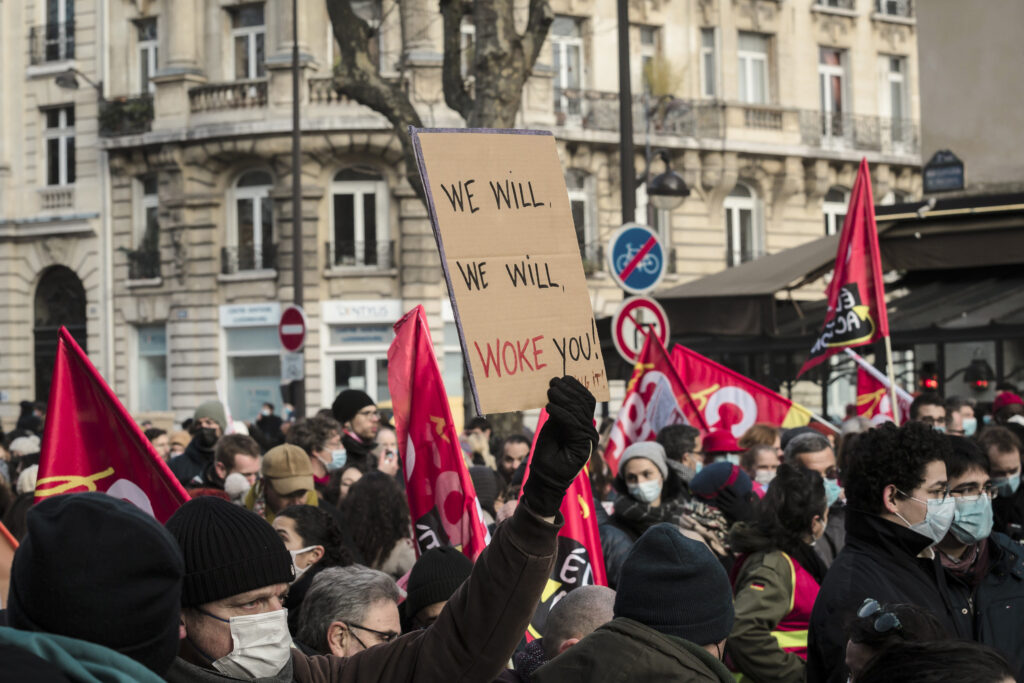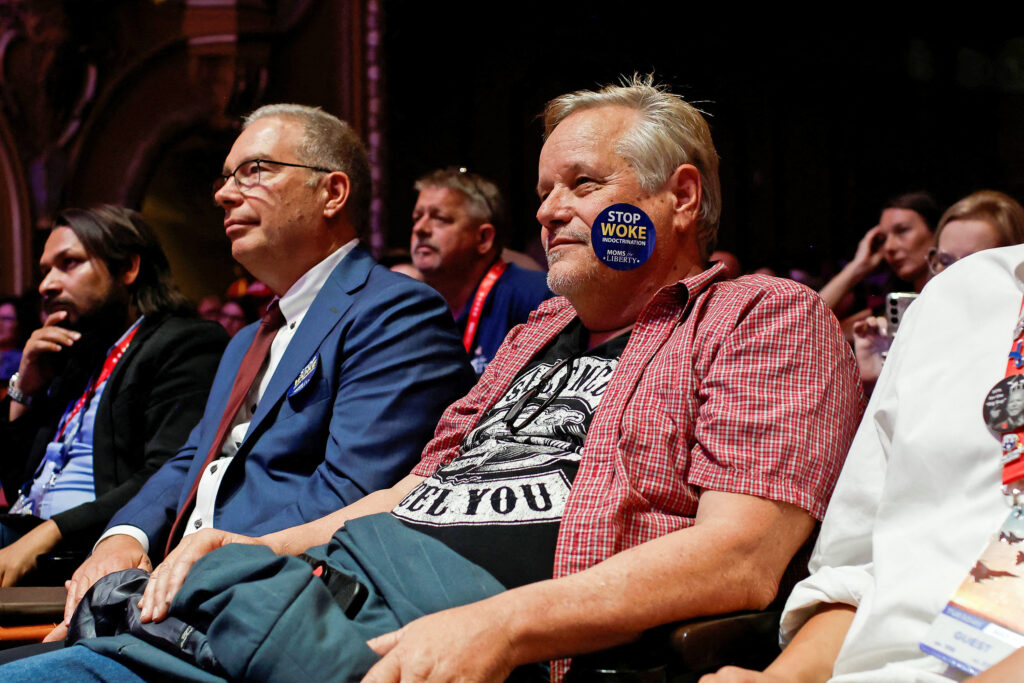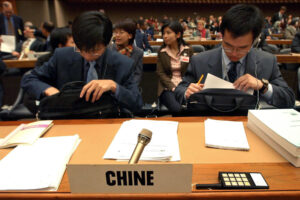Whither Woke?

In the film American Fiction, the culturally refined Dr Theolonius “Monk” Ellison, an African American author and professor, is struggling to get his highbrow novels published: the white gatekeepers to the literary world believe they are not “Black enough” and would rather put out ghetto stereotypes. So he writes a spoof novel, set in the hood, under the pseudonym Stagg R. Leigh. He calls it FUCK and pretends to be an author whose identity needs to be protected because he’s on the run from the police. It’s snapped up for a huge sum, giving Monk’s ghettofabulous doppelganger more money and attention than his culturally elevated original ever enjoyed. Later he is asked to join a judging panel for a book award, which has been accused of being too white. “I’m honored you’d choose me out of all the black writers you could go to for fear of being called racist,” says Monk facetiously.
FUCK is shortlisted for the award. The three white judges praise it as “gutsy”, “necessary” and “like gazing into an open wound”. When Monk and the only other Black judge argue that the book should not win the prize they are overruled by the three white judges, the most aggressively liberal of whom states: “I just think it’s essential to listen to black voices right now.” As the Black author of six books, much of the scene rang true to me. Indeed, the film wouldn’t work as a parody if it didn’t bear some resemblance to reality.
Navigating one’s way through the well-meaning, but often self-serving and platitudinous, world of liberalism, distinguishing pandering from praise, inclusion from tokenism or exclusion from elitism, is a fraught business. Issues of identity, power and influence are in flux and in play, allowing significant space for bad faith actors, rhetorical trip wires and emotional trigger warnings. In the words of Sinead O’Connor: “These are dangerous days/ to say how you feel is to lay your own grave.”
In We Have Never Been Woke: The Cultural Contradictions of a New Elite (2024), Musa al-Gharbi does not so much as lead us carefully through this minefield as grab us by the hand as he performs the can-can across it with a herd of holy cows in tow, allowing the collateral carnage to fall where it may. “For my first book I decided to go bold,” he explains. “I set out to write… the type of book that might get others excited about sociology and its potential to explain the world around us.” But one person’s bold is another person’s reckless; ultimately al-Gharbi leaves us more confused about both sociology and the world around us.
The title is borrowed from Bruno Latour’s book We Have Never Been Modern (1993). Latour argued that the dualistic distinction between science and nature that resides at the heart of modernist thought had in fact never existed; al-Gharbi sets out to collapse the material and symbolic within capitalism to prove that “wokeness” never actually existed. The premise draws heavily on the work of the late sociologist Pierre Bourdieu, who expanded and critiqued our understanding of capital beyond the Marxist definition of the relationship to the means of production so as better to understand how power and influence is exercised. Capital, wrote Bourdieu, has four different sources: economic capital (income, wealth, finance); social capital (networks, friendship groups, societal connections); cultural capital (education, knowledge, intellectual references); and symbolic capital (prestige and recognition).
Al-Gharbi’s stated focus is on the ‘symbolic capitalists’ whom he defines as someone “who exerts control over, and extracts profits from, the means of symbolic (re)production.” Barely distinguishing between symbolic, social and cultural capital, and ultimately folding them all in to one, he includes those engaged in “non manual work associated with the production and manipulation of data, rhetoric, social perceptions and relations, organizational structures and operations, art and entertainment, traditions and innovations…Think academics, consultants, journalism, administrators, lawyers, people work in finance and tech, and so on.” That includes al-Gharbi, a Black American assistant professor of communication and journalism at Stonybrook University – a fact that he willingly acknowledges, occasionally slipping from “they” to “we”. It certainly includes me (a Briton who left journalism after 26 years to become a professor of Sociology at the University of Manchester), the publishers, editors, academics and writers in American Fiction, including Monk himself, and my guess is virtually everyone who is reading this review.
These symbolic capitalists, he writes, like to think of themselves as victims, with those from minoritized groups conveniently forgetting their socio-economic privileges in order to leverage that sense of victimhood. But, in fact, they have formed a new elite. He goes on to examine almost every aspect of their lives from who they sleep with, vote for, donate to, what they read, earn, eat and spend and where they live and study, to make the case. In the broader story of how we got to where we are, at least politically and culturally, they are omnipresent if not quite omnipotent. “If we want to understand how almost anything happens in society today,” he insists, “symbolic capitalists have to be a core part of the story.”
And if we want to understand what motivates them we have to understand “woke” ideology because “wokeness can be fruitfully understood as the ruling ideology of this increasingly dominant elite formation.” The trouble, he argues, is that in a range of ways symbolic capitalists’ actions in their daily lives flatly contradict the very tenets of fairness and equality in which that ideology is rooted. The failure of symbolic capitalists to live up to their professed ideals, he says, is a matter of contradiction not hypocrisy. They genuinely believe in equality and fairness, they just do not apply those values to their own lives, instead using the language of social justice to gain more power and status without actually doing anything to advance the causes of social justice.
When you cast your net this wide, you will inevitably catch some fish. Al-Gharbi is right to allude to the over-indulgent, earnest, inauthentic fragility that has attached itself particularly to questions of identity. Mistaking personal discomfort for political marginalisation, the emotional is too often presented as the empirical, reducing serious questions of inclusion to the simple attempt to not upset anybody from an underrepresented group. And he is right to point out that protests about discrimination, particularly on college campuses, all too often leave the task of tackling inequality with Human Resources departments, effectively defanging the political challenge by leaving it in corporate hands.

The problem with the book is that it either fails to put these problems into any kind of meaningful context or, worse still, distorts the context in order to fit the argument. He refers to “symbolic capitalists” as though actual capitalists do not exist and he examines their “elite” status as though there are not other, far more powerful, elites or their power was irrelevant. As a result he is unable, or unwilling, to accurately locate and identify them within a system of power.
This leaves his arguments unmoored: a work of sociology that fails to engage with the fundamental ways in which society functions. Take American Fiction. The film works as a comedy on its own terms. But the premise makes more sense if one understands the dynamics of a publishing industry in which just two houses – PenguinRandom House and HarperCollins – own more than a third of the US book market while Amazon owns 50 per cent of the retail. Publishers are passing on Monk’s well-written, highbrow books because they don’t sell whereas they know how to package a book called FUCK. The symbolic capitalists in the publishing industry still have to answer to the actual capitalists who pay their wages and work within the system that exists: the free market. There is nothing symbolic about the bottom line.
We see this play out when he asks the other Black judge, an author whose hit book, he believes also panders to racial stereotypes, why she thinks her book has merit but FUCK does not.
“I write about what interests people,” she says.
“You write what interests white publishers fielding Black trauma porn,” says Monk.
“They’re the one buying the manuscripts. Is it bad to cater to their tastes?”
“If you’re okay feeding people’s base desires for profit–”
“I’m okay with giving the market what it wants.”
A significant part of the problem can be found in the title. Latour at least defines modernity before claiming it never existed. But al-Gharbi never actually tells us what “woke” is. Indeed he refuses to: “Perhaps to the consternation of some readers, I will decline to provide an analytical definition of the term.” He insists he is not using it “as a pejorative or a slur”. On this we should take him at his word; the trouble is that since he does not own the word he cannot control how it is understood and employed beyond the covers of his book. The meaning of “woke” is deeply contested. According to a USAToday/IPSOS poll from last year, 40 per cent of Americans believe it is an insult while 32 per cent think it is a compliment. A majority of Democrats and the under fifties believe it means to be “informed, educated on and aware of social injustices”; a majority of Republicans and the over 65’s believe it means “to be overtly politically correct and police other’s words”.
When Rake Ayola, the Black Welsh star of a British TV drama about a Black Welsh family, was asked to respond to critics who dismissed the show as woke she said: “I would say first explain what you mean by ‘woke’ and then we can have the conversation. If you can’t explain it, don’t hand me that word….If you don’t know, please be quiet because you’re incredibly boring.” Sticking it in a title, as al-Gharbi does, and then refusing to define it, is not only very unhelpful. It is an intellectual dereliction of duty.
It is also a political liability. Woke is not just a slur. It is a legislative weapon. In September 2024 the House of Representatives passed the End Woke Higher Education Act, which would seriously impact universities policies around hate speech on campus. (It didn’t get through the Senate.) In April 2022 Florida passed the Stop WOKE (Wrongs to Our Kids and Employees) Act which prevented schools from teaching certain issues relating to racism, sexism and privilege. (A district judge ruled parts of the law relating to workplace diversity were unconstitutional.)
None of this is a reason not to use the word. But it is the reason why al-Gharbi would need to define what he means by it in order for his argument to make any sense. Indeed, by failing to do so, much of the book is mired in confusion. “Ultimately,” he writes, “[symbolic capitalists] are running on borrowed time, and anti-Wokenings begin to die out after Wokenings wind down. While mainstream symbolic capitalists seem militant and extreme, “normies” are happy to align with anti-woke and conservative symbolic capitalists to bring them into line.” This is not just the regular word soup of tortured academic prose; it is more like a slalom race, zig-zagging in and out of contested terms and confected groups as he escapes anything approaching clarity.
Abstracted from meaning, “wokeness” is evoked as “the ruling ideology of this increasingly dominant elite formation.” Quite how “symbolic capitalists” became dominant and what they dominate is unclear. Al-Gharbi cannot seem to make up his mind whether they are completely effete and ineffectual or all powerful and influential. One moment he’s telling us that “symbolic capitalists are indispensable to the workings of contemporary capitalism writ large. It is difficult to understand how any systemic process works without accounting for people like us.” The next moment he’s pointing out that most of the work they (we?) do has no impact, with 82 per cent of academic articles in the humanities never being cited and very few people reading books or newspapers. So where does this power come from and how is it exercised?
How are we to understand this with regard to, say, the composition of the Supreme Court and the evisceration of reproductive rights, voting rights and gun control that has come with it? When the concentration of wealth and power is escalating at the rate that it is, wages have been effectively stagnant for the best part of half a century, economic and racial inequalities are growing and kids are being put in cages on the border, where is the evidence that academics, consultants, lawyers and journalists dominate much beyond their own realms? In short, in what sense can we call “wokeness” “a ruling ideology” when he won’t define the ideology and the people who actually make the rules are not doing anything that even vaguely might be understood as “woke”? And why, if the class ruled by this ideology is so dominant, are its interests being so regularly and consistently undermined?
Ultimately al-Gharbi presents an argument with too many babies and not enough bathwater – dismissing large sections of society and the opinions they hold both summarily and comprehensively, while failing to hold other centers of power and influence meaningfully to account. When he cites G. A. Cohen in his conclusion, asking “If you’re egalitarian how come you’re so rich?”, as though academics and lawyers becoming poorer would somehow benefit the poor, he lays bare the fundamental flaw in the book. He has erected a system of thought about how society works that bears little relation to the system of power on which that society actually operates. Having identified a problem, he mistakes it for the problem. And given the trajectory that America’s system of power is now on, that is a problem for all of us.
Gary Younge is a Professor of Sociology at the University of Manchester, UK, winner of the 2023 Orwell Prize for Journalism and the 2025 Robert B. Silvers Prize for Journalism. His most recent book is Dispatches From The Diaspora: From Nelson Mandela to Black Lives Matter.


